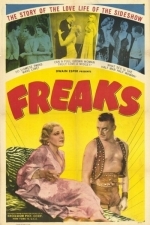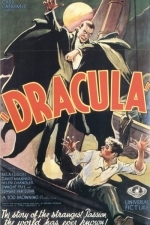Search
Search results
Werner Herzog recommended Freaks (1932) in Movies (curated)
LeftSideCut (3778 KP) rated Dracula (English) (1931) in Movies
Jul 6, 2020
It goes without saying that the importance of Dracula cannot be understated. Releasing in 1931, it was Universal Studios first steps into the horror genre, not long after 'talkies' became a thing, and surely paved the way for he mountain of horror titles that have come along since.
Bela Lugosi is Dracula, and though there have been fine portrayals of the titular vampire since, his performance lay the ground work for how a lot of media realise vampires to this day. He cuts a striking figure, he's suave and sinister, and the thick European accent is paramount to how he made Dracula a classic.
I first saw Dracula when I was a kid, and having watched it again recently, it's still a striking experience. While there may not be anything inherently frightening or scary by today's standards, the old black and white style, paired with long moments of uncomfortable silence (Director Tod Browning has exclusively worked on silent films before this), make for a suitably eerie atmosphere.
It's obviously a film that shows it age, but still hasn't lost any of it's charm. The version I watched recently was a Blu Ray restoration, and it's clear how lovingly that restoration has been implemented. Watching a film from the 30s look so crystal clear is something special.
Bela Lugosi is Dracula, and though there have been fine portrayals of the titular vampire since, his performance lay the ground work for how a lot of media realise vampires to this day. He cuts a striking figure, he's suave and sinister, and the thick European accent is paramount to how he made Dracula a classic.
I first saw Dracula when I was a kid, and having watched it again recently, it's still a striking experience. While there may not be anything inherently frightening or scary by today's standards, the old black and white style, paired with long moments of uncomfortable silence (Director Tod Browning has exclusively worked on silent films before this), make for a suitably eerie atmosphere.
It's obviously a film that shows it age, but still hasn't lost any of it's charm. The version I watched recently was a Blu Ray restoration, and it's clear how lovingly that restoration has been implemented. Watching a film from the 30s look so crystal clear is something special.
RəX Regent (349 KP) rated Dracula (English) (1931) in Movies
Mar 7, 2019
Where it all began...
Contains spoilers, click to show
The year was 1931: Two years after the success of The Jazz Singer and the final introduction of sound movies into the mainstream, sound was still revolutionising the industry. But in 1931, a bit like 3D now, there was still much confusion over to how make films, with directors, producers and actors alike, were still moving over from the suddenly dated silent era, with varying success.
Tod Browning was a man who would unfortunately find little success in the sound era, but not necessarily because he couldn't move with the times, but because his career was derailed a couple of years later by his disturbing horror pic, Freaks.
Dracula was shot THREE times. One, this one, was the conventional sound version that we all know. An other was shot at night and in Spanish for the benefit of that audience, which the studio supposedly preferred. This was quite common at this time, but little known nowadays. And the third was a straight forward silent version for the many theatres still un-equipped to handle sound.
But the styles of the silent era are all over this film. From the long silent reactions shots and the over acting, especially by Bela Lagosi in the titular role. This was also the adaptation of the stage adaptation of Bram Stoker's chiller, and was faithfully adapted from that source, hence the lack of more complex special effects, with bats on strings and fog machines, over more cinematic effects.
The transformation scenes for example, where the Count morphs from a bat to the undead human occur off-screen, rather than some form of cross fade etc. Is this a choice driven by lack of money? Lack of cinematic ambition of a choice to stick to the stage material? To be honest, I have too little knowledge or experience of Tod Browning's work to suggest a reason, but when all's said and done, it did work.
Let's be honest, this is 80 years old and is not the least bit scary and it is hard not to laugh, but in context, I'm sure it worked well at the time and the story is well conveyed. Lagosi's undead performance is hammy by today's standards but he was somewhat likable. He was very deliberate, slow and the silent era has certainly left its scars, as the subtly of sound performing was yet to take hold.
But this is the sort of film were silent melodramatic acting still worked. This is of course a piece Gothic Horror, the home of melodrama if ever there was one. This is surly a product of its time, both as the industry went through one of it's most dramatic changes, which ended so many careers as well a created so many new ones, but it's also, let's not forget, the first direct adaptation of Bram Stoker's book, besides the 1922 German version, Nosferatu, which changes a fair few details to try to get around the copyright, failing to do so mind, resulting in failed bid to have every copy of the film destroyed.
This is the film that ingrained the image of the Dracula that we know today into popular culture. This was were the Universal horror franchise began. For whatever faults it has by today's standards, it did something right.
Tod Browning was a man who would unfortunately find little success in the sound era, but not necessarily because he couldn't move with the times, but because his career was derailed a couple of years later by his disturbing horror pic, Freaks.
Dracula was shot THREE times. One, this one, was the conventional sound version that we all know. An other was shot at night and in Spanish for the benefit of that audience, which the studio supposedly preferred. This was quite common at this time, but little known nowadays. And the third was a straight forward silent version for the many theatres still un-equipped to handle sound.
But the styles of the silent era are all over this film. From the long silent reactions shots and the over acting, especially by Bela Lagosi in the titular role. This was also the adaptation of the stage adaptation of Bram Stoker's chiller, and was faithfully adapted from that source, hence the lack of more complex special effects, with bats on strings and fog machines, over more cinematic effects.
The transformation scenes for example, where the Count morphs from a bat to the undead human occur off-screen, rather than some form of cross fade etc. Is this a choice driven by lack of money? Lack of cinematic ambition of a choice to stick to the stage material? To be honest, I have too little knowledge or experience of Tod Browning's work to suggest a reason, but when all's said and done, it did work.
Let's be honest, this is 80 years old and is not the least bit scary and it is hard not to laugh, but in context, I'm sure it worked well at the time and the story is well conveyed. Lagosi's undead performance is hammy by today's standards but he was somewhat likable. He was very deliberate, slow and the silent era has certainly left its scars, as the subtly of sound performing was yet to take hold.
But this is the sort of film were silent melodramatic acting still worked. This is of course a piece Gothic Horror, the home of melodrama if ever there was one. This is surly a product of its time, both as the industry went through one of it's most dramatic changes, which ended so many careers as well a created so many new ones, but it's also, let's not forget, the first direct adaptation of Bram Stoker's book, besides the 1922 German version, Nosferatu, which changes a fair few details to try to get around the copyright, failing to do so mind, resulting in failed bid to have every copy of the film destroyed.
This is the film that ingrained the image of the Dracula that we know today into popular culture. This was were the Universal horror franchise began. For whatever faults it has by today's standards, it did something right.

